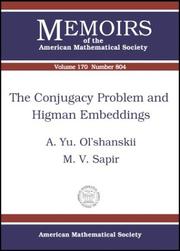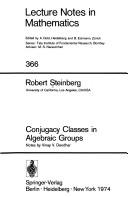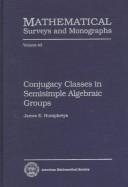| Listing 1 - 10 of 43 | << page >> |
Sort by
|
Book
ISBN: 3540139168 0387139168 3540391428 3662135574 9783540139164 Year: 1985 Volume: 1112 Publisher: Berlin: Springer,
Abstract | Keywords | Export | Availability | Bookmark
 Loading...
Loading...Choose an application
- Reference Manager
- EndNote
- RefWorks (Direct export to RefWorks)
Book
Year: 2016 Publisher: Providence, Rhode Island : American Mathematical Society,
Abstract | Keywords | Export | Availability | Bookmark
 Loading...
Loading...Choose an application
- Reference Manager
- EndNote
- RefWorks (Direct export to RefWorks)
The authors will classify Rohlin flows on von Neumann algebras up to strong cocycle conjugacy. This result provides alternative approaches to some preceding results such as Kawahigashi's classification of flows on the injective type II_1 factor, the classification of injective type III factors due to Connes, Krieger and Haagerup and the non-fullness of type III_0 factors. Several concrete examples are also studied.
Von Neumann algebras. --- Conjugacy classes. --- Group theory.
Book
ISBN: 0471941093 Year: 1993 Publisher: Chichester Wiley
Abstract | Keywords | Export | Availability | Bookmark
 Loading...
Loading...Choose an application
- Reference Manager
- EndNote
- RefWorks (Direct export to RefWorks)
Topological groups. Lie groups --- Conjugacy classes. --- Finite groups. --- Lie groups.
Book
ISBN: 1316192024 1316212378 1316190196 1316208680 1316210553 1316205029 1316206823 1139998323 Year: 2014 Publisher: Cambridge : Cambridge University Press,
Abstract | Keywords | Export | Availability | Bookmark
 Loading...
Loading...Choose an application
- Reference Manager
- EndNote
- RefWorks (Direct export to RefWorks)
Reversibility is a thread woven through many branches of mathematics. It arises in dynamics, in systems that admit a time-reversal symmetry, and in group theory where the reversible group elements are those that are conjugate to their inverses. However, the lack of a lingua franca for discussing reversibility means that researchers who encounter the concept may be unaware of related work in other fields. This text is the first to make reversibility the focus of attention. The authors fix standard notation and terminology, establish the basic common principles, and illustrate the impact of reversibility in such diverse areas as group theory, differential and analytic geometry, number theory, complex analysis and approximation theory. As well as showing connections between different fields, the authors' viewpoint reveals many open questions, making this book ideal for graduate students and researchers. The exposition is accessible to readers at the advanced undergraduate level and above.
Conjugacy classes. --- Group theory. --- Automorphisms. --- Dynamics. --- Reverse mathematics.

ISBN: 0821835130 Year: 2004 Publisher: Providence, R.I. American Mathematical Society
Abstract | Keywords | Export | Availability | Bookmark
 Loading...
Loading...Choose an application
- Reference Manager
- EndNote
- RefWorks (Direct export to RefWorks)
Group theory --- Frattini subgroups. --- Conjugacy classes. --- Embeddings (Mathematics) --- Plongements (mathématiques) --- Conjugacy classes --- Frattini subgroups --- Subgroups, Frattini --- Maximal subgroups --- Imbeddings (Mathematics) --- Geometry, Algebraic --- Immersions (Mathematics) --- Classes of conjugate elements

ISBN: 3540066578 0387066578 3540379312 Year: 1974 Publisher: Berlin
Abstract | Keywords | Export | Availability | Bookmark
 Loading...
Loading...Choose an application
- Reference Manager
- EndNote
- RefWorks (Direct export to RefWorks)
Book
ISBN: 9781470420161 Year: 2016 Publisher: Providence, Rhode Island : American Mathematical Society,
Abstract | Keywords | Export | Availability | Bookmark
 Loading...
Loading...Choose an application
- Reference Manager
- EndNote
- RefWorks (Direct export to RefWorks)
Von Neumann algebras. --- Conjugacy classes --- Group theory. --- Algèbres de Von Neumann --- Classes de conjugaison --- Théorie des groupes
Book
ISBN: 0471905542 9780471905547 Year: 1985 Volume: vol *25 Publisher: Chichester: Wiley,
Abstract | Keywords | Export | Availability | Bookmark
 Loading...
Loading...Choose an application
- Reference Manager
- EndNote
- RefWorks (Direct export to RefWorks)
Topological groups. Lie groups --- Finite groups --- Lie groups --- Groupes finis --- Groupes de Lie --- Conjugacy classes --- Classes of conjugate elements --- Group theory --- Groups, Lie --- Lie algebras --- Symmetric spaces --- Topological groups --- Groups, Finite --- Modules (Algebra) --- Groepentheorie --- Algèbres de Lie. --- Groupes (Théorie des). --- Lie (Algebra's van).

ISBN: 0821803336 Year: 1995 Publisher: Providence (R.I.) American Mathematical Society
Abstract | Keywords | Export | Availability | Bookmark
 Loading...
Loading...Choose an application
- Reference Manager
- EndNote
- RefWorks (Direct export to RefWorks)
Conjugacy classes --- Lie algebras --- Linear algebraic groups --- Semisimple Lie groups --- 512.74 --- 512.74 Algebraic groups. Abelian varieties --- Algebraic groups. Abelian varieties --- Semi-simple Lie groups --- Lie groups --- Algebraic groups, Linear --- Geometry, Algebraic --- Group theory --- Algebraic varieties --- Algebras, Lie --- Algebra, Abstract --- Algebras, Linear --- Classes of conjugate elements
Book
ISBN: 1283379961 9786613379962 1400842700 9781400842704 9781283379960 9780691153308 9780691153315 0691153302 0691153310 Year: 2012 Publisher: Princeton ; Oxford : Princeton University Press,
Abstract | Keywords | Export | Availability | Bookmark
 Loading...
Loading...Choose an application
- Reference Manager
- EndNote
- RefWorks (Direct export to RefWorks)
Convolution and Equidistribution explores an important aspect of number theory--the theory of exponential sums over finite fields and their Mellin transforms--from a new, categorical point of view. The book presents fundamentally important results and a plethora of examples, opening up new directions in the subject. The finite-field Mellin transform (of a function on the multiplicative group of a finite field) is defined by summing that function against variable multiplicative characters. The basic question considered in the book is how the values of the Mellin transform are distributed (in a probabilistic sense), in cases where the input function is suitably algebro-geometric. This question is answered by the book's main theorem, using a mixture of geometric, categorical, and group-theoretic methods. By providing a new framework for studying Mellin transforms over finite fields, this book opens up a new way for researchers to further explore the subject.
Mellin transform. --- Convolutions (Mathematics) --- Sequences (Mathematics) --- Mathematical sequences --- Numerical sequences --- Algebra --- Mathematics --- Convolution transforms --- Transformations, Convolution --- Distribution (Probability theory) --- Functions --- Integrals --- Transformations (Mathematics) --- Transform, Mellin --- Integral transforms --- ArtinГchreier reduced polynomial. --- Emanuel Kowalski. --- EulerАoincar formula. --- Frobenius conjugacy class. --- Frobenius conjugacy. --- Frobenius tori. --- GoursatЋolchinВibet theorem. --- Kloosterman sheaf. --- Laurent polynomial. --- Legendre. --- Pierre Deligne. --- Ron Evans. --- Tannakian category. --- Tannakian groups. --- Zeeev Rudnick. --- algebro-geometric. --- autodual objects. --- autoduality. --- characteristic two. --- connectedness. --- dimensional objects. --- duality. --- equidistribution. --- exponential sums. --- fiber functor. --- finite field Mellin transform. --- finite field. --- finite fields. --- geometrical irreducibility. --- group scheme. --- hypergeometric sheaf. --- interger monic polynomials. --- isogenies. --- lie-irreducibility. --- lisse. --- middle convolution. --- middle extension sheaf. --- monic polynomial. --- monodromy groups. --- noetherian connected scheme. --- nonsplit form. --- nontrivial additive character. --- number theory. --- odd characteristic. --- odd prime. --- orthogonal case. --- perverse sheaves. --- polynomials. --- pure weight. --- semisimple object. --- semisimple. --- sheaves. --- signs. --- split form. --- supermorse. --- theorem. --- theorems.
| Listing 1 - 10 of 43 | << page >> |
Sort by
|

 Search
Search Feedback
Feedback About UniCat
About UniCat  Help
Help News
News